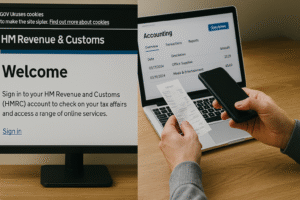Making Tax Digital (MTD) is transforming how landlords and company directors handle their tax returns. Here’s what you need to know – and how digital record-keeping can help you save time, stay compliant and strengthen your mortgage position
The UK’s tax system is evolving – and Making Tax Digital (MTD) sits at the heart of that change.
If you’re a company director, landlord, or self-employed professional, it’s essential to understand what this means for you. Not because I provide tax advice – I don’t – but because digital financial organisation plays a huge role in staying mortgage-ready.
In this article, I’ll explain what MTD means for you, what’s changing and how staying ahead can make borrowing smoother and stress-free. Making Tax Digital (MTD)?
Making Tax Digital is a UK Government initiative designed to modernise how individuals and businesses manage their tax affairs.
The aim is to reduce errors, improve accuracy and make tax submissions simpler through approved digital systems.
MTD began with VAT-registered businesses, which must now keep digital records and file returns using compatible software.
The next stage expands to cover income tax for self-employed individuals and landlords.
The long-term goal is a fully digital system that removes paper-based errors and simplifies the entire tax process.
You can read the full government overview here:👉 Making Tax Digital – GOV.UK

Where We Are Now: MTD for VAT
MTD for VAT is already active and mandatory for most VAT-registered businesses.
You must:
Keep your VAT records digitally.
Submit returns through HMRC-compatible software (manual entries are no longer accepted).
Use digital links that connect bookkeeping and submission systems.
The result? Better record accuracy, improved collaboration with accountants, and real-time insight into your financial position – all of which can help when lenders review your business performance for a mortgage.
However, understanding remains low. HMRC data shows that although 93% of businesses are aware of MTD, only around half fully understand the new requirements.
 What’s Changing: MTD for Income Tax
What’s Changing: MTD for Income Tax
The next phase affects landlords, sole traders, and self-employed individuals who currently file Self Assessment tax returns.
Key dates:
From April 2026: MTD applies to those earning over £50,000 from self-employment or property income.
From April 2027: Those earning between £30,000 and £50,000 will be included.
Lower thresholds are expected to follow.
How it works in practice:
You’ll send quarterly digital updates instead of one annual return.
A final declaration will confirm income after the tax year ends.
You must use MTD-compatible software to keep records and send updates.
You can still use spreadsheets, but only if they’re linked to HMRC-approved bridging software.
You can find the full details here:
👉 Using Making Tax Digital for Income Tax – HMRC Guidance
 Why This Matters for Landlords and Directors
Why This Matters for Landlords and Directors
Making Tax Digital (MTD) is more than a government initiative – it’s reshaping how landlords and company directors manage their finances.. For landlords, MTD ensures rental income and property expenses are accurately recorded and easily accessible, helping to reduce errors and make year-end reporting simpler. For company directors, it provides a clearer picture of business performance and makes it easier to align company accounts with personal financial goals.
If you’re a company director, maintaining digital records also improves how lenders view your income from salary, dividends and retained profits – giving you greater borrowing potential. You can discover more about this in my Company Director Mortgages guide, which explains how structured income reporting can help you secure more competitive mortgage options.
 What This Means for You
What This Means for You
The MTD landscape is changing – but with the right guidance, you can protect your investment, stay compliant and increase your property’s long-term appeal.
If you’d like to discuss how the latest EPC developments might impact your portfolio or future purchases, I’m happy to provide tailored advice to help you plan ahead.
How MTD Differs from Self Assessment
Feature | Self Assessment (Today) | MTD for Income Tax |
Submission frequency | Annual | Quarterly updates + final declaration |
Record-keeping | Annual, paper-based or digital mix | Must be digital, up to date quarterly |
Software requirement | Not strictly required | Must use HMRC-compatible software |
Penalties | Traditional late filing / payment penalties | New rules tied to non-compliance under MTD regime |
Visibility | You see the tax result only at year end | You can more easily track your tax liability incrementally |
 What You Should Do Now
What You Should Do Now
Here’s how to prepare for MTD — and protect your borrowing power:
Check your income level.
Determine whether your property and self-employed income will exceed the MTD thresholds in 2026 or 2027.Select the right software.
Use HMRC-recognised bookkeeping tools that keep your finances transparent and lender-ready.Stay consistent.
Keep your accounts up to date quarterly instead of waiting for year-end.Stay informed.
Check for new HMRC updates and ensure your accountant is fully aligned.Plan with your mortgage advisor.
I can help you structure your finances and borrowing strategy around digital reporting — making mortgage applications quicker and more efficient.
 Turning Regulation Into Opportunity
Turning Regulation Into Opportunity
Instead of seeing MTD purely as a compliance challenge, it’s worth viewing it as an opportunity to take control of your financial planning. Digital record-keeping allows you to track performance, plan ahead, and prepare your finances more effectively for lending or refinancing.
For landlords, this added visibility can help identify profitable opportunities and improve portfolio efficiency. My Landlord Mortgages page explores how clear financial data and proactive planning can support stronger lending outcomes and smarter investment growth.
Digital compliance doesn’t just keep you in line with HMRC – it can give you a real advantage in managing your finances and future property strategy.
Explore Related Buy-to-Let Strategies
Discover how staying organised under Making Tax Digital can strengthen your borrowing options and help you make smarter, mortgage-ready property decisions.
Portfolio Landlord Mortgages
Find out how accurate, digital record keeping can strengthen your mortgage profile and simplify portfolio expansion.
Explore Portfolio Strategies →Limited Company Buy-to-Let
Using a limited company structure can improve tax efficiency and borrowing flexibility. See how good financial organisation under MTD helps lenders view you more favourably.
See Company Solutions →SPV Mortgages
A Special Purpose Vehicle (SPV) can open doors to specialist lenders. Keeping MTD-ready accounts supports smoother applications and faster approvals.
Learn About SPVs → Expert Mortgage Advice Tailored to You
Expert Mortgage Advice Tailored to You
Whether you’re a company director, portfolio landlord, or self-employed, I can help you stay one step ahead.
By ensuring your financial records align with lender expectations, you’ll:
Avoid unnecessary delays and requests for extra information.
Secure the best possible mortgage options for your situation.
Maintain confidence knowing your finances are well-organised.
Whether you’re preparing for MTD or reviewing your portfolio, I can help ensure your finances are structured for stronger lending outcomes and future growth.
 Ready to Stay Mortgage-Ready Under Making Tax Digital?
Ready to Stay Mortgage-Ready Under Making Tax Digital?
Even though MTD focuses on tax reporting, it’s really about financial clarity – something lenders value highly.
If your records are accurate and digital, you’ll not only stay compliant but also strengthen your mortgage position and make future applications smoother.
Wondering How MTD Could Affect Your Mortgage?
Not sure how the new rules could influence your borrowing or property income? Call today for straightforward, lender-ready guidance.
Call NowPrefer to Email
Want tailored advice on how MTD could shape your future mortgage plans? Email today for personalised, mortgage-focused support.
Email Us

📞 Call me directly on 0808 503 4714 or 07508 147884
📩 Email: lyndsey@westwalesmoney.co.uk
#MakingTaxDigital #MTD2025 #LandlordFinance #DirectorInsights #BusinessPlanning

